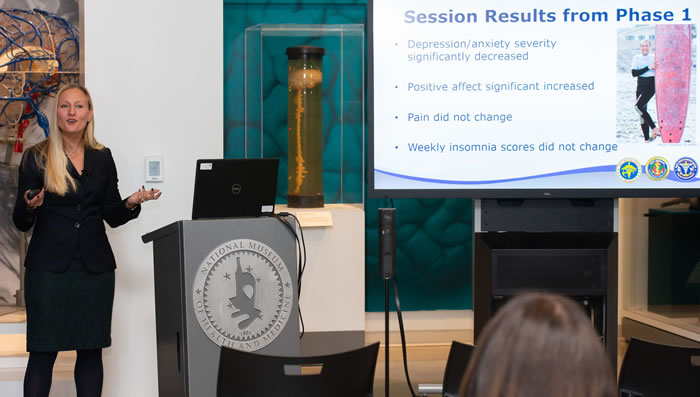Surfing Studied as Mental Health Therapy Option for Service Members, Veterans
By Lauren Bigge
NMHM Public Affairs Coordinator

Kristen Walter, Ph.D., clinical research psychologist from the Naval Health Research Center in San Diego, speaks about surf therapy phase one study results during her Medical Museum Science Café presentation titled "Reigniting the Stoke: The Psychological Effects of Surf Therapy" at the National Museum of Health and Medicine in Silver Spring, Md. (National Museum of Health and Medicine photo by Matthew Breitbart/Released)
Surfing is an emerging form of therapy for active duty military personnel and veterans with mental health symptoms, such as those associated with post-traumatic stress disorder (PTSD) and depression, Kristen Walter, Ph.D., clinical research psychologist from the Naval Health Research Center in San Diego, told Medical Museum Science Café attendees at the National Museum of Health and Medicine (NMHM) on Nov. 13.
She explained that surf therapy is used as an intervention to improve the mental health or well-being of individuals with various conditions. It is inherently physically and psychologically beneficial as a form of exercise, while unlikely to have the negative side effects often associated with traditional treatments, such as medication. Surf therapy combines factors that are important to mental wellness: physical activity, the natural environment, water, social interaction, and mindfulness. According to research, water-based activities decrease anger, depression, and tension.
Surfers also wait together for the next set of waves; that sort of social interaction is associated with improved mental health. They must focus in the moment, which can be a respite for individuals suffering from psychological disorders. "If you're not paying attention to the waves or the ocean, you run the risk of getting pummeled," Walter said. "There's this almost forced mindfulness."
The Naval Health Research Center and Naval Medical Center San Diego are engaged in a two-phase surf and hike therapy study for the treatment of major depressive disorder among active duty military. The first phase, which concluded in December 2017, was an evaluation of the surf therapy program that included 74 active duty service members. Of those 74 individuals, 54 percent met the criteria for probable PTSD while 43 percent met the criteria for probable major depression.
Surf therapy is part of a six-week program for the wounded, ill, and injured that was established in 2008. During each session, patients surf for three to four hours and have the option of practicing yoga on the beach for an hour prior to surfing. "Surf therapy is provided as standard medical care," she said. "Individuals attend the appointment, and they get a clinical note afterward. It is a six-week program. We partnered with them to understand the effects of the program and to see what the outcomes were. We administered a very brief assessment before and after they surfed to get the immediate effects."
The results: depression, anxiety, and PTSD symptoms, as well as negative emotions, significantly decreased during the course of the six-week program. Positive emotions increased, while pain and insomnia did not substantially change. Participants completed brief self-report questionnaires before and after each surf therapy session; findings showed reductions in depression and anxiety symptoms and increases in positive emotions over the course of the session. They did not experience substantial changes in pain and insomnia. Walter and her colleagues conducted an analysis of sub-samples for patients with probable PTSD or major depressive disorder and found that the results were even stronger for participants with these conditions.
The effects were strongest for positive emotions. "The inability to experience positive emotions is a symptom of both PTSD and depression," she said. "The fact that we could actually increase positive emotions through this therapy highlights potentially unique aspects of surf therapy that we don't get through standard treatments. I think that is a very notable finding." Seventy-five percent of study participants also received other treatments, such as psychotherapy, medications, or physical therapy, she added.
The collaborative study between the Naval Health Research Center and Naval Medical Center San Diego is currently half-way through the second phase, which involves either surf or hike therapy. The researchers want to compare surf therapy and hike therapy to study the effects of each on outcomes such as depression symptom severity.
"Our previous study indicates there are immediate benefits of surf therapy on mental health," Walter said. "The state of science suggests that there are psychological benefits that improve over time. It's possible that surf therapy can complement traditional treatment."
"NMHM public programs explore the impact of military medicine," said Andrea Schierkolk, NMHM public programs manager. "Dr. Walter's research efforts offer a novel approach to addressing alternative treatments for PTSD and major depressive disorder."
NMHM's Medical Museum Science Cafés provide forums for informal talks that connect the mission of the Department of Defense museum with the public. NMHM was founded as the Army Medical Museum in 1862 and is a division of the Defense Health Agency Research and Development Directorate. For more information on upcoming events, call 301-319-3303 or visit www.medicalmuseum.mil.



